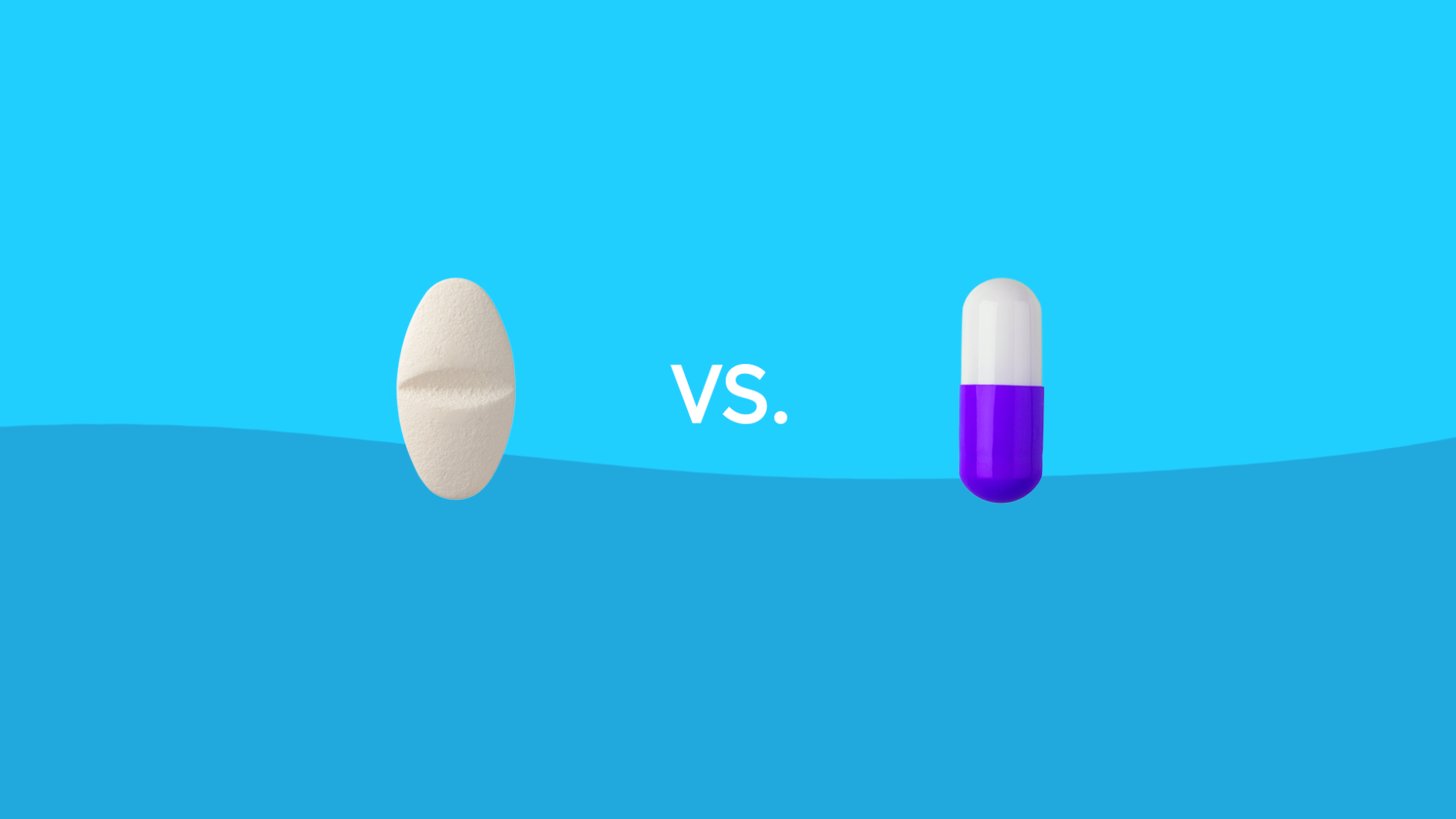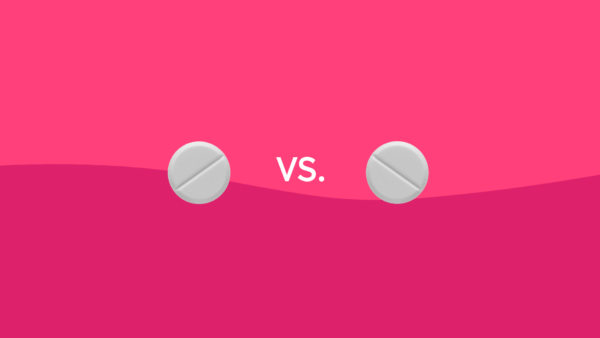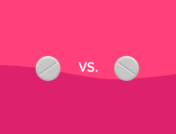Drug overview & main differences | Conditions treated | Efficacy | Insurance coverage and cost comparison | Side effects | Drug interactions | Warnings | FAQs
Attention deficit hyperactivity disorder (ADHD) is a common condition in the United States—6.1 million children between the ages of 4 to 17 years have been diagnosed with ADHD, and about 4.4 percent of adults have ADHD.
Concerta and Vyvanse are two stimulant ADHD medications approved by the U.S. Food and Drug Administration (FDA) to treat ADHD. Vyvanse can also treat moderate to severe binge eating disorder (BED) in adults.
Although Concerta and Vyvanse are both stimulants, they are not precisely the same. Continue reading to learn more about Concerta and Vyvanse.
What are the main differences between Concerta and Vyvanse?
Concerta and Vyvanse are both classified as stimulant medications. Both are classified as Schedule II drugs and a controlled substances by the U.S. Food and Drug Administration (FDA) because of the potential for abuse and dependence.
Concerta is used to treat ADHD in adults and children. Concerta is available in both brand-name and generic forms. The active ingredient of Concerta is methylphenidate (extended-release). Concerta is dosed once per day.
Vyvanse is used for the treatment of ADHD in adults and children. It can also be used for moderate to severe binge eating disorder in adults. The active ingredient in Vyvanse is called lisdexamfetamine. Lisdexamfetamine is known as a prodrug. The drug starts as lisdexamfetamine, which is inactive and is converted to its active form, dextroamphetamine, in the gastrointestinal tract and liver. This mechanism of action lowers Vyvanse’s abuse potential. Vyvanse is only available in the brand name form. There is currently no generic equivalent of Vyvanse. Vyvanse is dosed once daily.
The length of treatment with Concerta or Vyvanse varies. Some patients take a “drug holiday.” During a drug holiday, the medication is temporarily stopped, for example, during summer vacation when school is not in session. Your healthcare professional can help you determine if you or your child should take a drug holiday.
| Main differences between Concerta and Vyvanse | ||
|---|---|---|
| Concerta | Vyvanse | |
| Drug class | CNS stimulant | CNS stimulant |
| Brand/generic status | Brand and generic | Brand only |
| What is the generic name? | Methylphenidate hydrochloride (HCl), extended-release | Lisdexamfetamine dimesylate |
| What form(s) does the drug come in? | Extended-release tablet | Capsules, chewable tablet |
| What is the standard dosage? | 18, 27, 36, or 54 mg once daily in the morning (dosage depends on age and response to treatment). The maximum dose is 54 mg per day in children and 72 mg per day in adolescents and adults. | ADHD in adults or children (6 years and older): 30 mg to 70 mg daily in the morning (maximum dose is 70 mg/day) Binge eating disorder (moderate to severe) in adults: 50 mg to 70 mg daily in the morning (may start at 30 mg and slowly increase; maximum dose is 70 mg/ day) |
| How long is the typical treatment? | Varies: May be needed for extended periods but has not been studied for longer than 7 weeks; consult healthcare professional | Not studied for longer than 4 weeks; patients are closely monitored while on Vyvanse |
| Who typically uses the medication? | Ages 6 years to 65 | ADHD: Ages 6 years to 65 Moderate to severe binge-eating disorder: Adults |
Conditions treated by Concerta and Vyvanse
Concerta and Vyvanse can treat ADHD in children ages 6 years and older, adolescents, and adults. Concerta or Vyvanse should be part of a comprehensive treatment plan, including other components such as therapy and educational intervention. In addition to ADHD, Vyvanse is also used to treat adults with moderate to severe binge eating disorder (BED). Vyvanse is not indicated for weight loss or to treat obesity.
| Condition | Concerta | Vyvanse |
| ADHD (adults and children ages 6 years and older) | Yes | Yes |
| Moderate to severe binge eating disorder (adults) | No | Yes |
Is Concerta or Vyvanse more effective?
Although both medications undergo clinical trials for safety and efficacy in order to be approved by the FDA, there is little data that compares the two drugs to each other. In 2014, Shire announced results from 2 studies that compared the efficacy of Concerta to Vyvanse in patients ages 13 to 17 years old with ADHD. Each patient took Concerta, Vyvanse, or a placebo.
In the first study, the results looked at the change from baseline at week six in the Attention Deficit Hyperactivity Disorder Rating Scale-IV (ADHD-RS-IV) total score. At the end of the study, patients who took Vyvanse had a slightly larger reduction in the score (25.4 point reduction) compared to patients who took Concerta (22.1 point reduction) or placebo (17 point reduction). In this study, Vyvanse was found to be “statistically superior” to Concerta.
In the second study, patients were treated for eight weeks. In this study, patients who took Vyvanse had a 25.6 point reduction in ADHD-RS-IV total score. Patients who took Concerta had a 23.5 point reduction, and patients who took a placebo had a 13.4 point reduction. The researchers found this to not be statistically significant, but stated that Vyvanse “was found to have a larger mean reduction (improvement) of 2.1 points compared to Concerta on the primary efficacy analysis.”
Although Vyvanse was slightly more effective in this study, the medications were only studied in patients ages 13 to 17 years old. Also, there are many factors to take into consideration when choosing a medication that is best for the patient, including ADHD symptoms, the potential for abuse, potential side effects and drug interactions, and cost, among other factors. For example, in one patient, generic Concerta may be effective as well as cost-efficient. In another patient, Vyvanse may be better suited due to a lower potential for abuse as well as the ability to treat binge eating disorder.
Before taking Concerta or Vyvanse, tell your doctor about your symptoms, medical history, and other medical conditions you have as well as all of the medications you take. If you have a history of abuse or dependence (this can include alcohol, prescription drugs, or street drugs), tell your doctor. Only your doctor is qualified to determine which drug is appropriate for you, based on all of this information.
Coverage and cost comparison of Concerta vs. Vyvanse
Brand-name Concerta is not generally covered by Medicare prescription plans. Generic Concerta may be covered by Medicare prescription plans, depending on the plan. It may be covered by insurance, usually in its generic form. The out-of-pocket cost for 30 tablets of brand-name Concerta 54 mg tablets can be more than $200. Choosing generic Concerta can reduce the price to approximately $40.
Vyvanse is usually covered by insurance but is generally not covered by Medicare prescription plans. The out-of-pocket cost of 30 capsules of Vyvanse 50 mg is approximately $500. Using a free SingleCare coupon can lower the price to approximately $350.
Contact your insurance provider for up-to-date insurance coverage information. You can save money on Concerta or Vyvanse using a free SingleCare card.
| Concerta | Vyvanse | |
| Typically covered by insurance? | Coverage varies—generic is usually covered | Yes |
| Typically covered by Medicare Part D? | No | No |
| Quantity | #30, 54 mg tablets | #30, 50 mg capsules |
| Typical Medicare copay | $15-$479 | $4-$385 |
| SingleCare cost | $40+ | $350+ |
Common side effects of Concerta vs. Vyvanse
Common side effects of Concerta include stomach pain, appetite and weight loss, headache, dry mouth, nausea, insomnia, anxiety, dizziness, irritability, and increased sweating.
Common side effects of Vyvanse in people with ADHD include appetite and weight loss, anxiety, dizziness, dry mouth, irritability, insomnia, nausea, vomiting, and stomach pain. In people with binge eating disorder, the most common Vyvanse side effects are dry mouth, insomnia, appetite loss, increased heart rate, jitters, constipation, and anxiety.
Allergic reactions are rare. If you have symptoms of an allergic reaction, such as hives, difficulty breathing, or facial swelling, get emergency medical help immediately.
This is not a full list of side effects. Serious side effects may occur. Consult your healthcare provider for a full list of adverse effects that can occur with Concerta or Vyvanse.
| Concerta | Vyvanse | |||
| Side Effect | Applicable? | Frequency | Applicable? | Frequency |
| Upper abdominal pain | Yes | 6.2% | Yes | 12% |
| Loss of appetite | Yes | 25.3% | Yes | 39% |
| Weight loss | Yes | 6.5% | Yes | 9% |
| Headache | Yes | 22.2% | Yes | 1% |
| Dry mouth | Yes | 14% | Yes | 5% |
| Nausea | Yes | 12.8% | Yes | 6% |
| Irritability | Yes | 5.8% | Yes | 10% |
| Anxiety | Yes | 8.2% | Yes | 6% |
| Excess sweating | Yes | 5.1% | Yes | 4% |
| Vomiting | Yes | 2.8% | Yes | 9% |
| Fever | Yes | 2.2% | Yes | 2% |
| Dizziness | Yes | 1.9% | Yes | 5% |
| Insomnia | Yes | 2.8% | Yes | 22% |
| Cough | Yes | 1.9% | No | — |
Sources: Concerta (DailyMed), Vyvanse (DailyMed)
Drug interactions of Concerta vs. Vyvanse
Concerta or Vyvanse should not be taken with monoamine oxidase inhibitors (MAOIs), because the combination could cause a hypertensive (high blood pressure) crisis. Concerta or Vyvanse should be separated from an MAOI by at least 14 days.
Concerta or Vyvanse should not be used with other medications that increase serotonin, such as antidepressants, triptans for migraine, and the cough suppressant dextromethorphan. The combination of drugs can increase the risk of serotonin syndrome, a life-threatening condition caused by the buildup of serotonin.
Concerta or Vyvanse should be used with caution with vasopressor agents (medications used to increase blood pressure) because of the potential for an increase in blood pressure.
This is not a complete list of drug interactions. Consult your healthcare provider for a complete list of drug interactions. Before taking Concerta or Vyvanse, tell your doctor about all the medications you take, including prescription and over-the-counter medicines and vitamins or supplements.
| Drug | Drug Class | Concerta | Vyvanse |
| Phenelzine Rasagiline Selegiline Tranylcypromine |
MAOI | Yes | Yes |
| Dobutamine Epinephrine Norepinephrine Phenylephrine |
Vasopressor agents | Yes | Yes |
| Blood pressure medications | All categories | Yes | Yes |
| Warfarin | Anticoagulant | Yes | No |
| Citalopram Escitalopram Fluoxetine Fluvoxamine Paroxetine Sertraline |
SSRI antidepressants | Yes | Yes |
| Desvenlafaxine Duloxetine Venlafaxine |
SNRI antidepressants | Yes | Yes |
| Amitriptyline Desipramine Imipramine Nortriptyline |
Tricyclic antidepressants | Yes | Yes |
| Eletriptan Rizatriptan Sumatriptan Zolmitriptan |
Triptans for migraine | Yes | Yes |
| Dextromethorphan | Cough suppressant found in many OTC and Rx cough and cold preparations | Yes | Yes |
| Codeine Fentanyl Hydrocodone Methadone Morphine Oxycodone Tramadol |
Opioids | Yes | Yes |
| Phenobarbital Phenytoin Primidone |
Anticonvulsants | Yes | Yes |
| Risperidone | Atypical antipsychotic | Yes | No |
Warnings of Concerta and Vyvanse
Every time you fill a prescription for Concerta or Vyvanse, you will receive a medication guide. This guide contains information about the drug, such as side effects and warnings. Concerta and Vyvanse both have a black box warning. A black box warning is the strongest warning required by the FDA. Due to the risk of abuse or dependence, before being prescribed Concerta or Vyvanse, the patient must be evaluated for the risk of abuse. Also, patients taking Concerta or Vyvanse are monitored for signs of abuse during treatment. When the medication is stopped, the patient should be closely supervised as well.
Certain patients should not take Concerta or Vyvanse. When a medication should not be used in certain instances, this is called a contraindication. Concerta and Vyvanse are contraindicated in patients who have an allergy to the medication or any ingredient in the medicine. Also, Concerta or Vyvanse should not be used within two weeks of a monoamine oxidase inhibitor (MAOI).
The prescribing information for Concerta also advises that people should not take Concerta if they have:
- Significant anxiety, agitation, or tension
- Glaucoma
- Tics or Tourette’s syndrome (or family history)
Vyvanse’s warnings include using the drug with caution in people with glaucoma and tics or Tourette’s (but it is not expressly contraindicated in these patients).
Other warnings
- Stimulant medications have caused sudden death—in rare cases—in children and adolescents with certain serious heart problems or abnormalities. This can occur even at regular doses. Sudden death, stroke, and heart attack have also occurred in adults. Concerta or Vyvanse should not be used in patients with heart problems or abnormalities (such as heart disease or arrhythmia).
- Concerta or Vyvanse should be used with caution in people with high blood pressure or problems with the heart or heart rate. Concerta and Vyvanse can increase blood pressure and heart rate. Patients should be monitored while taking Concerta or Vyvanse.
- Allergic reactions are rare. Patients with hives, trouble breathing, or swelling of the face, throat, tongue, or neck, should get emergency medical help.
- In people with a preexisting psychotic disorder (such as bipolar disorder), Concerta or Vyvanse may exacerbate symptoms. Patients should be screened before taking a CNS stimulant.
- When starting ADHD treatment with Concerta or Vyvanse, patients should be monitored for the appearance—or worsening of—hostility or aggression.
- Patients with a history of seizures should be prescribed stimulants with caution because stimulants can lower the seizure threshold. Concerta or Vyvanse should be stopped if seizures occur.
- Prolonged and painful erection (priapism) has occurred with stimulants. Priapism requires immediate medical attention.
- Patients who take Concerta or Vyvanse should be monitored for peripheral vasculopathy, including Raynaud’s phenomenon.
- Children who take stimulants every day year-round may have a temporarily slowed growth rate. The doctor will monitor growth during stimulant treatment.
- Concerta or Vyvanse may cause blurred vision. If this occurs, consult a healthcare professional for medical advice.
- When taking Concerta or Vyvanse, there is a risk of serotonin syndrome. Serotonin syndrome is life-threatening and caused by a buildup of excess serotonin. It is more likely to occur during a dosage increase or an overdose or when Concerta or Vyvanse is taken along with other drugs that increase serotonin. Symptoms may include agitation, hallucinations, delirium, rapid heartbeat, dizziness, flushing, tremor, incoordination, seizures, nausea, vomiting, and/or diarrhea. Serotonin syndrome requires emergency medical attention.
- Keep Concerta or Vyvanse in a safe place, out of the reach of children and pets. Keeping the medication in a safe place helps prevent misuse and abuse.
Concerta:
- Patients with certain gastrointestinal (GI) conditions should not take Concerta. The Concerta tablet does not change shape in the GI tract and could cause obstruction.
- The Concerta tablet should not be crushed, split, or chewed. Swallow the tablet whole. The inactive shell of the tablet may be present in the stool—this is a normal occurrence.
Vyvanse:
- The Vyvanse capsule should be swallowed whole. Patients who have difficulty swallowing the pill can open the capsule, mix the entire contents with water, yogurt, or orange juice, mix, and consume immediately.
- Vyvanse chewable tablets should be thoroughly chewed before swallowing.
Frequently asked questions about Concerta vs. Vyvanse
What is Concerta?
Concerta is a central nervous system (CNS) stimulant. It is used to treat ADHD in adults and children ages 6 and older. Concerta contains long-acting methylphenidate and is taken once a day.
What is Vyvanse?
Vyvanse is a CNS stimulant. It is used to treat ADHD in adults and children ages 6 and older. It can also be used to treat moderate to severe binge eating disorder in adults, but it is not indicated for weight loss and does not treat obesity.
Are Concerta and Vyvanse the same?
Concerta and Vyvanse are both central nervous system stimulants. They are similar but not exactly the same. Both can be used to treat ADHD, and Vyvanse can also be used to treat binge eating disorder. The two drugs have some similarities and some differences, outlined above.
Some examples of other stimulant medications include Ritalin (methylphenidate), Quillivant XR, Focalin, and Adderall (amphetamine salts).
Is Concerta or Vyvanse better?
While one study showed that Vyvanse was slightly more effective than Concerta (see above section “Is Concerta or Vyvanse more effective?”), both medications have undergone safety and efficacy studies, and there are many factors to take into consideration when choosing a medication. Your healthcare provider can determine if Concerta or Vyvanse is an appropriate drug for you, taking into account symptoms, medical and family history, and other medications you take that could interact with Concerta or Vyvanse.
Can I use Concerta or Vyvanse while pregnant?
Stimulants such as Concerta or Vyvanse are generally not used in pregnancy due to lack of safety information and the risk of harm to the unborn baby. Contact your prescriber right away if you take Concerta or Vyvanse and find out that you are pregnant.
Can I use Concerta or Vyvanse with alcohol?
Avoid alcohol when taking Concerta or Vyvanse. While these medications are CNS stimulants, alcohol is a CNS depressant. They work against each other, which can make you feel less intoxicated. This feeling may cause you to drink more, which could lead to accidents or alcohol poisoning (which can cause nausea, vomiting, irregular heartbeat, difficulty breathing, seizures, or even death). Using stimulants with alcohol can also cause heart problems.





